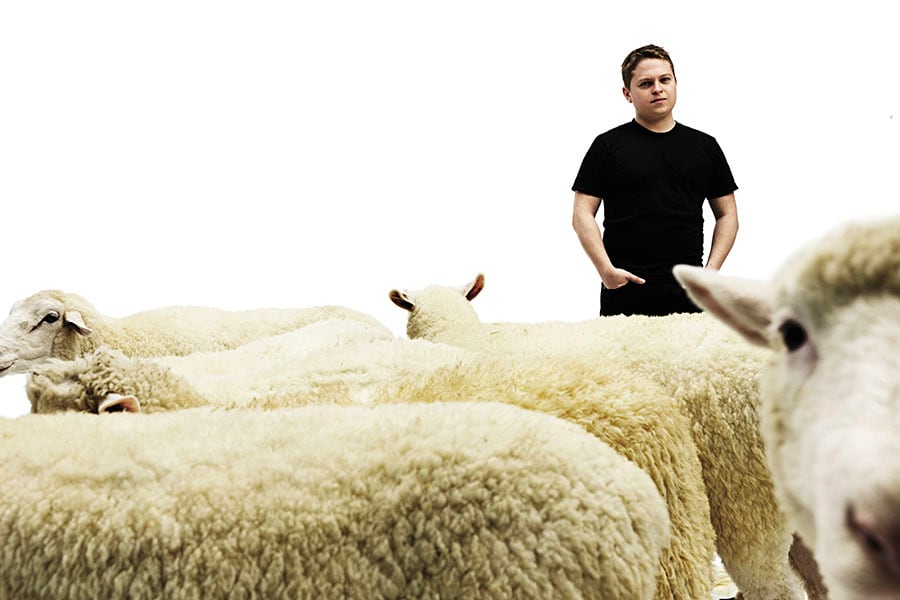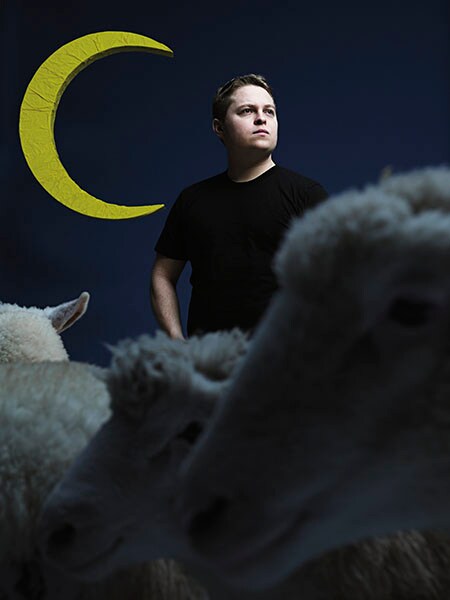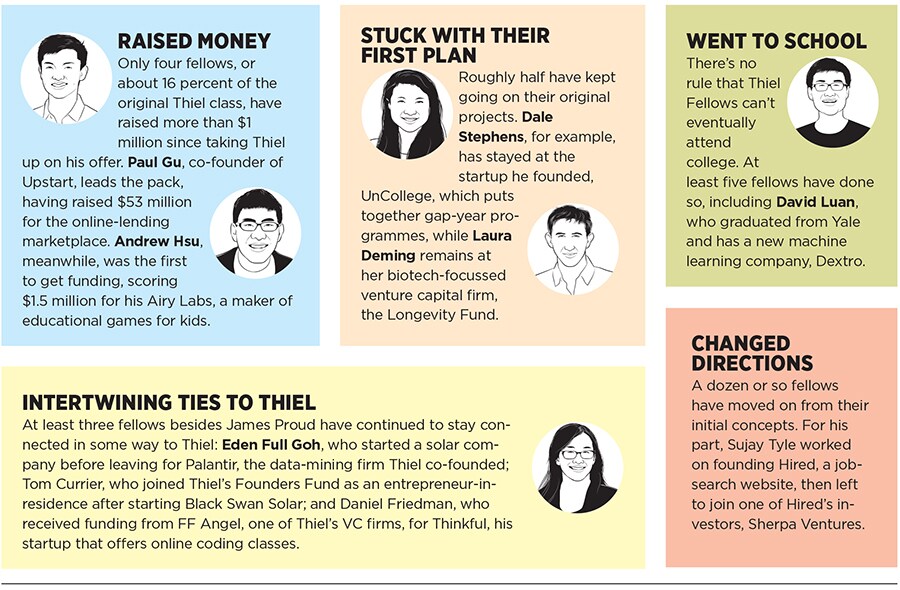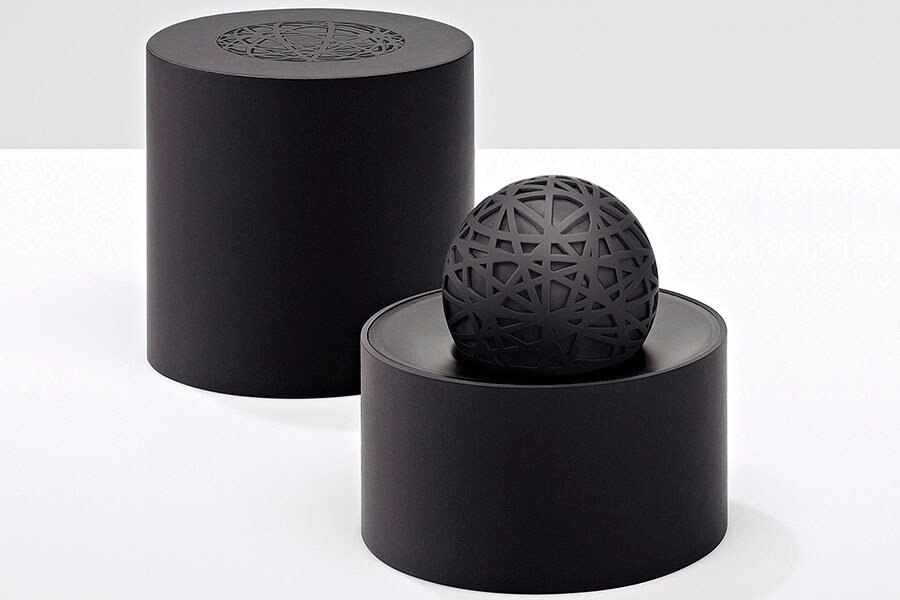This 25-year-old wants to help you sleep better
James Proud has a quarter-billion riding on reinventing how you sleep. And this original Thiel Fellow is determined to do it his way—or fail trying


 The Peter Thiel fellowship changed James Proud’s life, turning him from an unknown programmer to a member of an inaugural class of wunderkinds
The Peter Thiel fellowship changed James Proud’s life, turning him from an unknown programmer to a member of an inaugural class of wunderkinds
Image: Ethan Pines For Forbes
It’s only six blocks from James Proud’s office, a brick-walled converted bakery in San Francisco’s Mission District, to Central Kitchen, a hip restaurant owned by fellow Forbes 30 Under 30 alum Thomas McNaughton, but that’s plenty of time for the 25-year-old to take on more or less all of Silicon Valley. People who complain about finding good talent just don’t know how to recruit. Traditional venture capital firms? Unnecessary. By the time we reach the host stand, he’s deriding the entire tech community for their “airy-fairy bulls*#t about changing the world.”
This absolutism feels all the more jarring given that his short, bulldog frame and pudgy baby face make him look like the high school computer-lab nerd he once was, a persona buttressed by his wardrobe (a sweatshirt and sweatpants almost all the time, a black T-shirt if he’s feeling dressy) and diet (no vegetables, no fish). The latest in the 21st-century cavalcade of cocky prodigies in the mould of Sean Parker, Mark Zuckerberg and Evan Spiegel, Proud was born thumbing his nose at other people. “No one can make me do what I don’t want to do,” he says. He’s been professionally bred this way, too.
James Proud was in the first class of Thiel Fellows, the upstarts—122 and counting—who for the past seven years have taken $100,000 each from billionaire contrarian Peter Thiel on the condition they skip college. And he’s also the most successful. Over the past four years, he’s raised roughly $40 million for his startup, Hello, mostly at a $250 million valuation. He’s recently been raising bridge financing, at an even higher valuation, including a direct $2 million ante from the godfather himself, Thiel. It’s his first personal investment in one of his fellows. “James stood out from the start as extremely tenacious and determined,” Thiel says.
And now he’s rich, too. Proud still owns about half of Hello, pushing him well into centimillionaire territory.
Proud’s chosen market is right up there with death and taxes in terms of universality: Sleep, which has suddenly become a bit more sexy and a bit less sleepy than it has been for the past few millennia. “You’re starting to see a shift in conversation around sleep that happened in the ’80s around exercise and in the ’90s and 2000s with organic and healthy eating,” Proud says. Arianna Huffington has raised $7 million for Thrive Global, which offers a suite of products and services driven by the idea that more sleep translates to a better life, and Casper, the mattress-will-change-your-life startup, has raised $70 million.
Proud’s focus is on hardware, specifically an orb the size of a tennis ball that sits on your bedside table and uses a variety of hidden sensors to track your movements and the surrounding night-time atmosphere. The $149 gadget, called Sense, grades your sleep on a scale from 0 to 100—and tries to help you improve that score over time. Proud claims that the Sense holiday rollout at Target is the biggest the retailer has ever done for a new electronics product (Target says that’s incorrect).
Big orders won’t guarantee big success, at least not immediately. A source close to the company says the internal sales projection for 2017 is 250,000 Sense units, implying net revenues in the ballpark of $20 million. Tiny compared even to a flagging competitor like Fitbit, which likely finished 2016 with sales of more than $2.3 billion—and even at that size, it’s barely profitable. Meanwhile, a triad of monoliths—Amazon, Apple and Google—stand determined to put connected devices on every conceivable surface of your body and in every space in your home.
What does Proud think of his trillion-dollar competitors? Looking up from his lamb ribs and roast pork, he lifts both hands in a double-middle-finger salute.
It’s the kind of brashness that a Peter Thiel could love. That tack surely worked for Zuckerberg and Spiegel. But youthful hubris goes back to Icarus, and that tale didn’t end with an IPO. Given his complicated market, dotted with pitfalls and entrenched enemies, Proud will ultimately demonstrate whether unswerving self-confidence is a necessary entrepreneurial attribute or a potentially fatal flaw. At the Forbes Under 30 Summit in Boston last October, Proud was asked backstage whether he’d ever met Richard Branson, whom he would soon join on a panel. “The real question,” Proud responded, “is whether Branson has ever met me.”
Proud grew up less than an hour away from Branson’s childhood home south of London. His father worked for the British civil service, and his mother was a secretary who later stocked grocery-store shelves at night. Proud preferred haunting the computer lab to making friends on the playground. His first internet payday came at the age of 12, when he built a website for a scammer he had met through an online forum (he spent the money on a Sony Ericsson mobile phone and Creative Labs MP3 player). As a hired hand for web projects, he began making hundreds of dollars per job. At one point, his PayPal account was frozen because he was underage, so cash arrived in the mail, prompting questions from his parents.
Image: Ethan Pines For ForbesAt 17, Proud started GigLocator, a website that aggregated concert-ticket information, and persuaded his parents to let him take a gap year to work on it. He fed himself by faking hole punches on loyalty cards from a British chicken chain, Nando’s, or else schmoozing venture capitalists and other European techies over lunch, always letting them pick up the cheque. “Already back then, James had this laser-sharp focus about what he was going to do for the next ten years,” says Spotify founder Daniel Ek, who met Proud playing ping-pong during that period. “It was incredibly rare to see that from someone who should have been more focussed on girls and school.”
Proud would have been the first in his family to attend college, but when the day came to enrol, he refused to go, despite his parents’ pleas. Then, on a September day in 2010, Proud found his saviour at 1 am while watching a live stream of the TechCrunch Disrupt conference. There Thiel announced his eponymous fellowship: A $100,000 grant to each of 20 teenagers who wanted to skip college to pursue another dream. Proud decided to apply on the spot.
When Thiel flew the finalists out to hobnob in San Francisco, Proud was surrounded by preppy American kids with acceptances to Harvard they wanted to turn down. He returned to London, sure he wouldn’t make the cut. “I wished I didn’t even come,” Proud says. “I was going to have to go back and hate my life because I’d seen that this would be so much better.” But in April 2011, Thiel’s organisation called to give him the good news. They also told him to sit tight until July. Proud, of course, was in a hurry—and not listening to anyone who would stop him. He quickly emptied his savings to buy a plane ticket and then demanded the first Thiel cheque be sent early, lest he end up sleeping on the street. They caved.
The fellowship changed Proud’s life, turning him from an unknown programmer living with his parents to a member of an inaugural class of wunderkinds. While crashing on air mattresses and couches for most of the next year, he took advantage of every door the Thiel brand opened across Silicon Valley. For a time Proud worked out of PayPal co-founder Max Levchin’s incubator, and in June 2012, he offloaded GigLocator to the concert promoter Peter Shapiro, earning himself a cool six-figure payday. (“That’s one young, smart motherf*#er,” says Shapiro.)
Soon after, Proud began raising money for a new stealth startup that would become Hello. “I said, ‘I’m in for whatever amount you’ll let me in for’,” says Shakil Khan, an early Spotify investor that Proud befriended in London. “He said, ‘I still haven’t finalised what it’s going to be’. And I said, ‘That’s irrelevant’.”
The original idea for Hello was to build a better version of the activity-tracker wristband pioneered by Fitbit and Jawbone. Proud recruited a handful of young hardware engineers and spent 18 months developing a prototype, which included a magnetic strap similar to one that would later appear on the Apple Watch. But over time, Proud quietly soured on its potential. He noticed that no one on his team wore any existing product on his or her wrist for more than a few weeks. Consumer surveys show similar results, with estimates that about a third of wearables owners give up on their devices within the first six months. Plus, competition was fierce. Google would announce Android Wear in March 2014, and the Apple Watch debuted in September. Proud was already late to a category in which he no longer believed. “So what do you do? Do you give the money back to investors and send everyone home?” he asked.
The epiphany came when Proud flew out to New York City to attend a birthday party in March 2014. Distracted by his dilemma, he brainstormed about products that wouldn’t need to be worn at all times and suddenly arrived at sleep tracking. People enjoyed the feature on wristbands but hated wearing them overnight. He brought the team together when he returned and told them they would be scrapping a year-and-a-half of work to start over. “I wore the wristband prototypes for a good two weeks after, holding on to the work we had done,” says Hello’s first industrial designer, Rob Shook. Proud also had to sell his decision to an angry group of investors who had supported a $7 million Series A only months earlier. To placate them, he granted additional shares to everyone who participated in the round, including Khan, David Marcus, then-PayPal president, and Hugo Barra, then-Xiaomi vice president. “Had the decision to pivot come three months later, I don’t think the company would have survived,” says Dan Rose, Facebook’s vice president of partnerships and Hello’s only board member other than Proud. 
Proud’s move away from wearable devices took Hello out of a crowded but expanding market—an estimated 67 million smart watches will be sold this year—and made it the pioneer of a completely new one. “If it can work, it can end up being a consumer device on par with the iPod,” Thiel says. A huge if. Searching for scientific backing, Proud hired Matthew Walker, director of the Sleep & Neuroimaging Laboratory at the University of California, Berkeley, as Hello’s chief scientist. Walker believes that lack of sleep is an “epidemic” in First World countries and that Sense can help fix that. After one year of use, 71 percent of Sense users slept longer on average than they had before, and 57 percent had more regular wake-up times, the company claims. Hello hopes to do even better as it tests more personalised sleep techniques.
Proud proved there was a market for sleep-centred products, at least among early adopters, with a successful Kickstarter campaign in July 2014. After racing to build a basic hardware prototype and marketable software façade, Hello launched its campaign with a slick video and a goal of $100,000. It blew past the finish line, scoring $1 million in the first four days and $2.4 million after one month, just a hair shy of VR phenomenon Oculus Rift’s crowdfunding haul. That summer proved an intoxicating high, but there was so much to do to make the marketing pitch a reality that four bottles of celebratory champagne sat in the office refrigerator unopened until this past Thanksgiving.
Hello promised delivery by November 2014 but delayed the first shipments until February as production challenges mounted. Sense is a two-part system that includes a bedside device—an amalgam of LEDs, circuits and sensors to detect light, sound, temperature and air quality, all stuffed into a small sphere—and an accompanying battery-powered, Bluetooth-enabled ‘Sleep Pill’, which clips to your pillow to track movement. The team had to design many of the manufacturing tools themselves. That following June, Hello brought in a $30 million cash infusion at the $250 million valuation from the likes of Temasek Holdings, a government-owned investment fund in Singapore, but the rest of the year was lost to fixing bugs and rewriting core features. In 2016, as Amazon rolled out the Echo and Google revealed Google Home, both voice-enabled wireless speakers, Proud pushed the team to add voice controls to the latest Sense, which went on sale this past November.
“The big challenge is always: Can you lock in the market enough before people develop copycats that are cheaper and roughly equivalent?” Thiel says. “This is always something a little harder for hardware than software.”
Unfortunately, even the new version feels like an unfinished product searching for a market. After trying it for a week, I enjoyed Sense’s novelty as a smarter alarm clock with limited voice commands and the ability to turn off the alarm with a wave of your hand. But for my $149, the core functionality is too inconsistent. It’s supposed to detect when you fall asleep and wake up, and analyse your tossing and turning to see how many hours you’re in deep sleep. Yet the Sense interprets data gathered from the clip on my pillow rather than a band on my wrist, so it frequently fails to register when I get up from bed and often confuses my fiancée’s movement for my own. Even if it were accurate, neither the sleep results nor other measurements are groundbreaking. Everyone already knows that blackout curtains are good for beauty rest and a barking dog is bad.
Other warning signs abound. Proud boasts about the new Hello displays in nearly 700 Target stores across the country, but the only inventory in Oakland was one Sense tucked in a side cabinet next to some Apple TVs and Linksys wireless routers. A survey of Best Buys around New York found only one with the product in stock other stores indicated you needed to order it. And when I brought a Sense home, I nearly abandoned the set-up process after an hour of trying and failing to plug in the charging cable. Hello says a new manufacturer had constructed the USB port a millimetre off target in a few units.
While plenty of questions remain about Sense, Proud now treats his risky pivot as a thesis statement. He trashes devices that need to be worn (like the Apple Watch) or require direct interaction (like the home assistants from Amazon and Google). His goal is to cover the entire 24 hours of your day with a few “non-engagement” health-tracking devices like Sense. “It’s a tragedy that we can’t build and release them all right now,” Proud asserts.
He’ll need to diversify his product line soon to avoid the fate of other hardware startups like fellow Kickstarter darling Pebble, which shut down in December, and drone maker 3D Robotics, which crashed after burning through $100 million in funding. Even public companies like Fitbit (trading down 86 percent from its peak) and GoPro (down 90 percent) have struggled. “On one hand, it’s easier than ever to build a hardware product,” says Jan Dawson, analyst at Jackdaw Research. “But in some ways it’s harder than ever to be competitive and build a sustainable business.”
In the meantime, Proud must mature as the leader of a 50-employee startup trying to go toe-to-toe with companies that outnumber and out-finance him. While friends extol Proud as wise beyond his years, former Hello staffers describe him as a smart but inveterate risk-taker who often unravels in tense situations. “You could see the pressure got to him, and sometimes I would think it’s because he’s young,” a former Hello engineer says. “He would suddenly rush in saying, ‘We need to do X because people are complaining about it’.” Instead of patiently adhering to a long-term plan, Proud is prone to rash decisions. “The ability to take risks and be aggressive is the foundation of James’s decision making, and it may eventually come back to bite him,” says one ex-Hello employee who worked closely with Proud for more than two years. “If that day never comes, he’s a genius. If it does, the warning signs were there.”  The sleep doctor is in: For $149, the Sense is designed to track your sleep—and analyse how to make it better Proud doesn’t deny he can be a capricious boss. In December 2014, on the morning an engineer was set to fly to China to install the final firmware for the Sense’s first manufacturing run, Proud decided to add one more feature. His CTO, Tim Bart, told him it was insane to change anything in the code at such a late hour, but Proud was suddenly convinced that Sense should light up and play a sound when it was plugged in for the first time—like a computer booting up.
The sleep doctor is in: For $149, the Sense is designed to track your sleep—and analyse how to make it better Proud doesn’t deny he can be a capricious boss. In December 2014, on the morning an engineer was set to fly to China to install the final firmware for the Sense’s first manufacturing run, Proud decided to add one more feature. His CTO, Tim Bart, told him it was insane to change anything in the code at such a late hour, but Proud was suddenly convinced that Sense should light up and play a sound when it was plugged in for the first time—like a computer booting up.
After a bruising argument, Proud got his way. The engineer finished coding the change on the cross-Pacific flight, and through skill and luck avoided introducing new bugs into the final product. Was that last minute intervention a Steve Jobs-like moment of product genius or the power trip of an enabled, immature founder? Proud’s analysis of his behaviour in hindsight is simple and unapologetic: “Well, I was right.”
First Published: Feb 22, 2017, 07:35
Subscribe Now